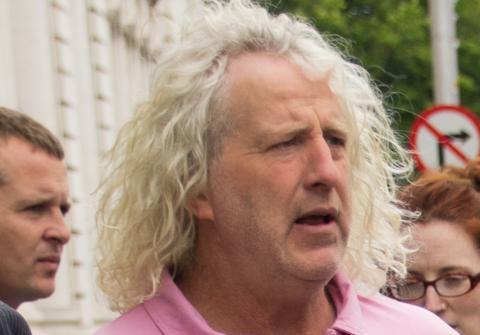Plans to censure Wallace are brazenly hypocritical

The hypocrisy of our political class over plans to censure Mick Wallace is quite breathtaking. By Vincent Browne.
Over the years, many of us have become inured to the serial hypocrisy of our political class but every now and again the brazenness of that hypocrisy becomes so breathtaking that our tolerance for it breaks. Now is such a moment and it concerns the plans to censure Mick Wallace.
According to himself, Wallace lied in issuing a false VAT declaration on behalf of a company he controlled. He says he did it because he couldn’t pay the full amount of VAT due at the time, because of a cash flow crisis in his company. This is surprising for he could have declared correctly the VAT that was due and then delayed payment, as thousands of companies have done, notably since the financial crisis broke in 2008.
So there is a suspicion he did so with the intention of defrauding on VAT – he denies this vehemently and his subsequent conduct would seem to support his denial. There is also an issue to do with payments he made from the company to himself and his son, which might amount to fraudulent preference but this is by no means clear. But what is clear is that he made a false VAT declaration and that is a criminal offence.
So, in a normal, decent society, he would be deserving of censure and of the appropriate criminal sanctions. But the society of our political establishment is different.
On 31 March 2011, the Dáil passed the following motion: “That Dáil Éireann: notes the final report of the Moriarty tribunal; believes that the conduct of Deputy Michael Lowry set out in the tribunal’s report was completely unacceptable for a member of the House; and calls on Deputy Lowry to voluntarily resign his membership of Dáil Éireann.” No formal vote was taken but only Lowry himself registered dissent from the motion. The other 165 deputies indicated assent for the motion of censure on the basis of a report that not one of them had read.
However, deputies had an idea that the Moriarty tribunal report had made disturbing findings and indeed it had. It had found that Lowry had received €1,173,396 in cash and other benefits from Denis O’Brien between July 1996 and December 1999, in the aftermath of O’Brien’s company, Esat Digifone, being awarded the second mobile phone licence by the department of which Lowry was a minister in 1996.
It also found O’Brien had contributed €71,298 to Fine Gael during the period from March 1995 to June 1996, during which time the deliberations on the award of the second mobile licence were under way.
O’Brien sold Esat Digifone to British Telecom in 2000 for €2.92 billion (IR£2.3 billion); personally he made €367 million (IR£289 million) from the sale. O’Brien then removed his domicile to Portugal to avoid paying the a capital gains tax bill of €70 million, the State which had awarded him the means of making this fortune, upon which he has made a further fortune estimated at about €2 billion. This gives an appreciation of the significance of the award given to O’Brien’s company – by far the most bountiful award in the history of the State, excepting the September 2008 bank guarantee.
Elaine Byrne, in her book Political Corruption in Ireland 1922-2010, extracts from the Moriarty tribunal report the following paragraph, which encapsulates what Lowry did: “Lowry displayed an appreciable interest in the substantive process, had irregular interactions with interested parties at its most sensitive stages, sought and received substantive information on emerging trends, made his preferences as between the leading candidates known, conveyed his views on how the financial weakness of Esat Digifone should be countered, ultimately brought a guillotine down on the work of the (departmental) Project Group, proceeded to bypass consideration by his Cabinet colleagues, and thereby not only influenced, but delivered, the result that he announced on 25th October, 1995, that Esat Digifone had won the evaluation process, which ultimately led to the licensing of Esat Digifone on 16th May, 1996.”
Following the censure motion Lowry continued as a member of Dáil Éireann and ministers continued to deal with him publicly and privately on issues he raised with them, as though the motion had never been passed.
As for O’Brien, he has been feted by Government ministers since that censure; Enda Kenny knowingly (in advance) made a very public appearance in his company at the New York Stock Exchange; and while censure was declared on Lowry, not a word of disapprobation has been uttered by Enda Kenny or any Fine Gael Minister about O’Brien.
And now O’Brien has been permitted to assume control of the country’s largest media enterprise (aside from RTÉ), in addition to his extensive control in the radio segment, a media power that will enable him to influence public opinion and, at least indirectly, Government policy, in the direction of his already very considerable personal interests.
Meanwhile, first on the political agenda is not this alarming concentrating of media power but another censure motion, this time on an Independent, backbench TD over the falsification of a tax declaration. And the fact that Fianna Fáil, Labour and, notoriously, Fine Gael, engaged in tax fraud for years is of no consequence at all.
God save Ireland. {jathumbnailoff}
Image top: infomatique.
